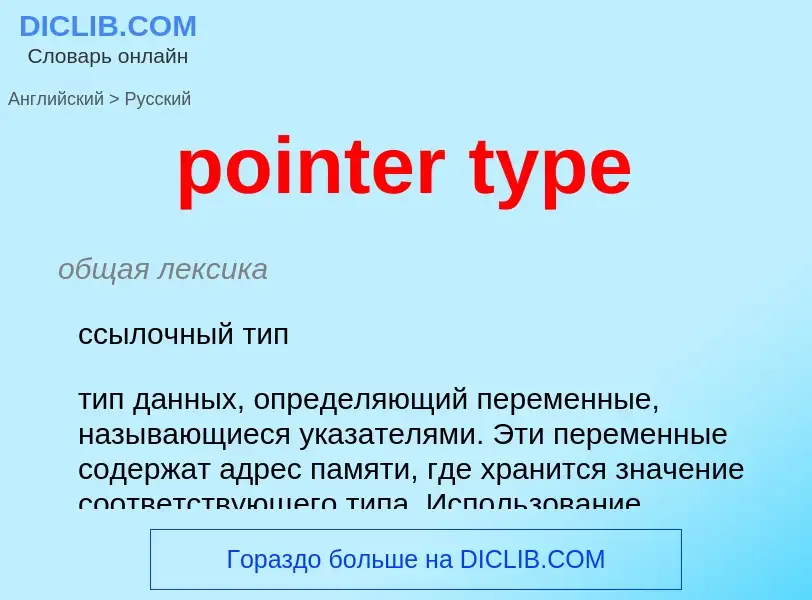Traducción y análisis de palabras por inteligencia artificial ChatGPT
En esta página puede obtener un análisis detallado de una palabra o frase, producido utilizando la mejor tecnología de inteligencia artificial hasta la fecha:
- cómo se usa la palabra
- frecuencia de uso
- se utiliza con más frecuencia en el habla oral o escrita
- opciones de traducción
- ejemplos de uso (varias frases con traducción)
- etimología
pointer type - traducción al Inglés
общая лексика
ссылочный тип
тип данных, определяющий переменные, называющиеся указателями. Эти переменные содержат адрес памяти, где хранится значение соответствующего типа. Использование указателей, с одной стороны, ускоряет работу программы, а с другой, - затрудняет контроль правильности программы
синоним
Смотрите также
общая лексика
адресная арифметика с указателями
широко используется в языках Си и C++
Смотрите также
общая лексика
лектотип
Definición
Wikipedia
In computer science, a pointer is an object in many programming languages that stores a memory address. This can be that of another value located in computer memory, or in some cases, that of memory-mapped computer hardware. A pointer references a location in memory, and obtaining the value stored at that location is known as dereferencing the pointer. As an analogy, a page number in a book's index could be considered a pointer to the corresponding page; dereferencing such a pointer would be done by flipping to the page with the given page number and reading the text found on that page. The actual format and content of a pointer variable is dependent on the underlying computer architecture.
Using pointers significantly improves performance for repetitive operations, like traversing iterable data structures (e.g. strings, lookup tables, control tables and tree structures). In particular, it is often much cheaper in time and space to copy and dereference pointers than it is to copy and access the data to which the pointers point.
Pointers are also used to hold the addresses of entry points for called subroutines in procedural programming and for run-time linking to dynamic link libraries (DLLs). In object-oriented programming, pointers to functions are used for binding methods, often using virtual method tables.
A pointer is a simple, more concrete implementation of the more abstract reference data type. Several languages, especially low-level languages, support some type of pointer, although some have more restrictions on their use than others. While "pointer" has been used to refer to references in general, it more properly applies to data structures whose interface explicitly allows the pointer to be manipulated (arithmetically via pointer arithmetic) as a memory address, as opposed to a magic cookie or capability which does not allow such. Because pointers allow both protected and unprotected access to memory addresses, there are risks associated with using them, particularly in the latter case. Primitive pointers are often stored in a format similar to an integer; however, attempting to dereference or "look up" such a pointer whose value is not a valid memory address could cause a program to crash (or contain invalid data). To alleviate this potential problem, as a matter of type safety, pointers are considered a separate type parameterized by the type of data they point to, even if the underlying representation is an integer. Other measures may also be taken (such as validation & bounds checking), to verify that the pointer variable contains a value that is both a valid memory address and within the numerical range that the processor is capable of addressing.

.jpg?width=200)
![Linnaeus]], is the type species for the genus ''[[Bufo]]'' Linnaeus]], is the type species for the genus ''[[Bufo]]''](https://commons.wikimedia.org/wiki/Special:FilePath/Bufo bufo (Marek Szczepanek).jpg?width=200)
![dorsal]] and 2) ventral aspect of holotype,<br>3) dorsal and 4) ventral aspect of paratype dorsal]] and 2) ventral aspect of holotype,<br>3) dorsal and 4) ventral aspect of paratype](https://commons.wikimedia.org/wiki/Special:FilePath/JamidesEliotiMUpUnAC1.jpg?width=200)
![Type illustration of ''[[Mormopterus acetabulosus]]'' Type illustration of ''[[Mormopterus acetabulosus]]''](https://commons.wikimedia.org/wiki/Special:FilePath/Mormopterus acetabulosus type illustration.jpg?width=200)
